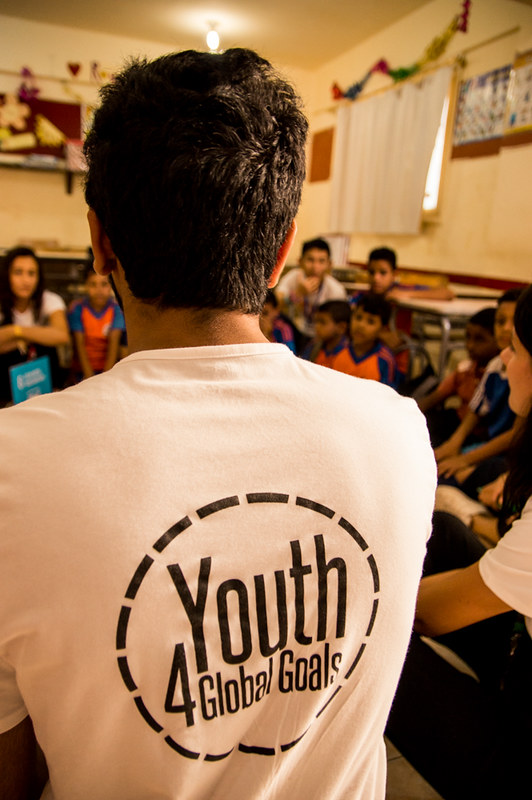Changing the world, one volunteer at a time
By piperacero

Have you ever felt judged for the way you look? Or speak? Or just for being different? Unfortunately, discrimination has become an increasingly prevalent issue; from hatred towards the Asian community with the initial spread of COVID-19 to the murder of George Floyd which reignited the Black Lives Matter (BLM) movement. Growing discrimination is entrenched within our society. However, it is promising to see young people tackle these deep-rooted societal issues. One organisation paving the way for cross-cultural communication and understanding is AIESEC.

AIESEC is the largest youth-run organisation in the world. Established in 1948, following World War 2, the organisation specialises in facilitating international volunteering and internship exchanges for young people. They aim to build global relationships and foster cooperation between people of different nationalities. To learn more about how AIESEC instills these values in youth, I interviewed Razvan Popescu, the AIESEC’s Vice President of Outgoing Global Volunteering in Manchester, and Soh, a Moroccan exchange participant.
Q: What is cultural inclusivity for you?
Razvan: “When I think about cultural inclusivity, my mind immediately goes to diversity. Just think about all the people in your life that come from different backgrounds than yours. There are thousands of different ways of living that you never even thought about. Cultural inclusivity is the reason we’re able to understand and support the needs of people from diverse cultures and backgrounds. So, in essence, cultural inclusivity means awareness, understanding, and compromise.”
Soh: “To me, cultural inclusivity means respecting each other’s cultural differences and creating a sense of belonging.”
Q: What made you choose to work as an exchange facilitator/exchange participant at a cultural exchange organization?
Razvan: “I chose to work in an organisation that promotes cultural exchange because I believe in the ethos of AIESEC: we believe that if you get to see the world, then you get to understand it, and if you get to understand it, then you get to change it. When we learn more about different cultures and behaviours, we slowly step out of the bubble we live under; a bubble that is highly affected by the lack of cultural inclusivity in our society.
“Therefore, I am strongly optimistic that by going abroad and improving leadership skills in a challenging environment a young person can make a small positive change in the world. And when a hundred people get to do it, the impact is even bigger. Imagine what will happen when millions take on this opportunity.”
Soh: “During my six-week exchange in Morocco, I’ve learned to appreciate other cultures and ideas and become more open to compromise. Over time, it becomes easier to shed self-consciousness about looking silly.”
Q: What sets the impact of AIESEC apart from other exchange programs?
Razvan: “AIESEC is all about leadership development. We believe that the youth is capable of achieving peace and fulfillment of humankind’s potential. We allow young people to join our organisation, develop their skills in an extremely diverse environment, and on top of that, become the leaders of tomorrow, which is seen in every single testimonial given by AIESEC alumni.
“Additionally, AIESEC is a place where you can fail as many times you want to, without being judged or feeling excluded. I never thought I would become so resilient and solution-orientated after my time in AIESEC, but I can see the impact it had on me and many others. AIESEC is the platform that exponentially enhanced my passion to make a positive change in the world”
Q: How important are cultural exchanges, taking into consideration current issues such as the BLM movement?
Razvan: “Cultural exchanges force you to leave your comfort zone and place you in a different environment where, at first, everything is entirely different than what you are used to. You fully comprehend the fact that everyone else is living a life just like you. Although the food they eat may be different, they eat it in the same way. They go to work every day, they love each other and celebrate life just like you. You feel grateful that you got the opportunity to experience this but then, you ask yourself: How can others think differently? What makes people capable of discrimination?
“It is so easy to feel trapped by hopelessness. When you turn on the TV or read the news, you can see that the world faces many issues; from homophobia, gender inequalities, racism, and a climate crisis, all of which affect our contemporary moment and the generations to come. Hope, on the other hand, is harder to find. However, there are many opportunities to find hope; from a book you can read about the history of your country, an alternative to plastic in the local supermarket, or a BLM protest that is taking place just across the street. People have an endless amount of opportunities to choose from if they want to work towards a better future. Upon leaving the exchange, you learn an important lesson: young people will always fight for what is right and for making a change.”
Soh: “I really recommend going on cultural exchanges because it can break the wall between us when we come together and share a common experience. By connecting with other exchange participants, we will see that we have a lot of similarities instead of differences.”

Going on an exchange is a wonderful opportunity for youth to broaden their world view. It reminds us that there is so much beyond what we see in our own countries.
Hopefully, these programs will be a positive step forward in embracing an international community. In the words of Razvan, “it’s not a matter of ‘will the change happen?’, it’s a matter of ‘how soon can we make this change happen?’”







